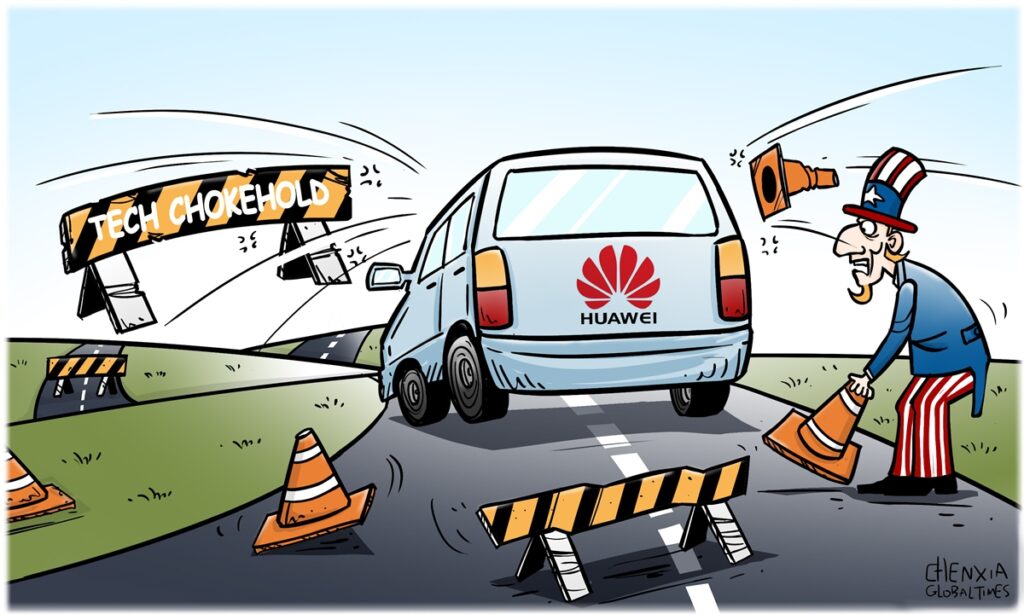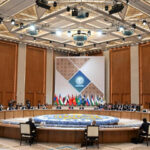Despite the 2019 National Defense Authorization Act that bars the US government agencies from contracting with any entity using Huawei components, the Pentagon is pushing for an exemption from the ban on the Chinese tech giant, with defense officials warning that it could jeopardize national security if not resolved, according to a Bloomberg report on Wednesday.
Ironically, the US had used “national security” as an excuse when it imposed the ban on Huawei. It is evident to see that this ban was not based on so-called national security concerns at all, but was a political decision to suppress China’s high-tech industry through the crackdown on Huawei. The US imposes restrictions on various products from Huawei, but it does not take into account the specific situation in different departments and fields. Now when it comes to the implementation stage, various problems begin to emerge. The Pentagon’s call fully proves that unilaterally banning a Chinese company, especially a company with immense size and influence like Huawei, the US’ consideration was immature, and it was just a ridiculous decision made on the spur of the moment.
Bloomberg mentioned that Huawei is “so firmly entrenched” in the systems of countries where it does business, given the company accounts for nearly a third of all global telecommunications equipment revenue, finding a replacement would be “impossible.” This shows that the US’ ban on Huawei has begun to hurt some of the core parts of the country’s system.
Huawei’s products are competitive and popular in terms of price and quality. Therefore, it is almost impossible for the US to find complete substitutes. And Washington thus can only choose to accept more expensive products, or products with inferior quality to Huawei’s. Moreover, the process of finding substitutes would be long, and such substitution will bring more economic burden to the US.
Zhang Tengjun, deputy director of the Department for Asia-Pacific Studies at the China Institute of International Studies, believes that in the current environment in the US, it is unlikely that the ban on Huawei will be completely lifted across the country. However, the reality is that the US may have to consider continuing to use some of Huawei’s products. This will obviously further showcase the double standards of the US on this issue. In other words, the excuse of “national security” cited by Washington is untenable, which simply demonstrates the hypocrisy of the US itself.
Ultimately, the Huawei ban didn’t reach Washington’s expectation to halt the Chinese company’s technology development. Instead, it has provided an opportunity for the company to work on enhancing self-reliance. In an article published by the Economist titled “America’s assassination attempt on Huawei is backfiring” on June 13 reads that Uncle Sam’s attacks failed to kill Huawei, but have only “made it stronger.”
Washington’s containment may have brought some troubles to Chinese companies in the short term, but in the long run, the US actually has no chance of winning in the “wars” it has waged.
It can be said that the US’ suppression of Huawei is unprecedentedly severe, but the company’s resilience is also unprecedentedly strong, which is like a banner for other Chinese enterprises. Under Washington’s extreme pressure to force Chinese companies to “withdraw from US market,” Huawei is an excellent example of how far a Chinese company can go.
There will gradually be more backlash against the US itself, because Huawei’s competitiveness is obviously increasing, said Lü Xiang, a research fellow of US studies at the Chinese Academy of Social Sciences. He noted that the US has restricted Huawei’s products in the name of national security to protect its own related manufacturers, but this kind of protection only maintains the backward production capacity in the US. In this case, such protection actually blocks US progress, and the backfire on the US will become clearer and clearer in the longer term.
Global Times




